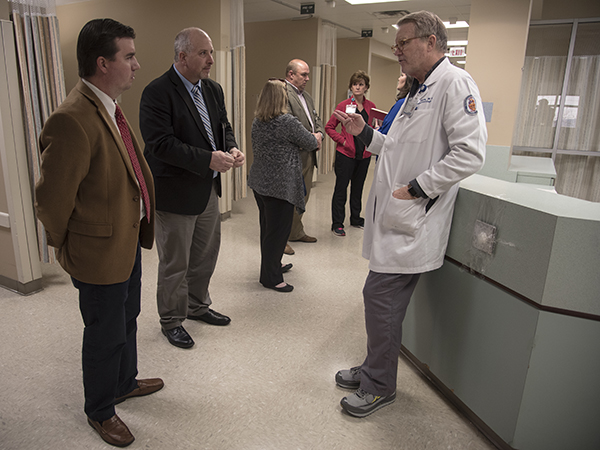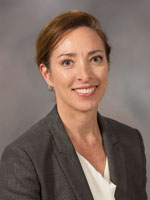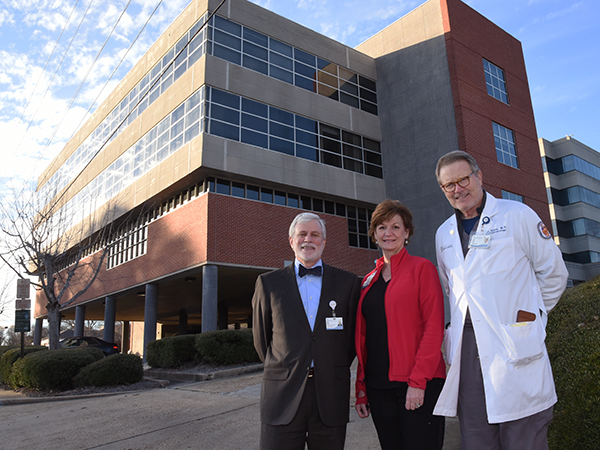UMMC gastro, endoscopy services to get new off-campus home

Gastroenterology services at the University of Mississippi Medical Center are moving to more spacious and tech-savvy quarters after growing out of the clinic and procedure areas on the main Jackson campus.
Patients will be seen as University Physicians-Belhaven, which includes leased clinic space on the second floor of the Watkins Building at 1421 N. State St., and an adjacent building for outpatient procedures that has been purchased by UMMC. It's in keeping with the Medical Center's quest to meet the state's tertiary care needs for specialty services and to enhance the education of its residents and fellows, said Dr. Jim Sones, professor and chief of the Division of Digestive Diseases and its clinical services, University Gastro.
The move also frees up much-needed space at the Medical Center for other patient needs.
“We've been bursting at the seams,” Sones said. “This furthers our mission as a tertiary referral center to help patients that were being sent out of state for special procedures to stay here. We get many referrals from gastroenterologists out in the state. We work hand in hand with them.”

Since coming to the Medical Center three years ago, Sones has overseen the tripling of the University Gastro medical team at the same time as patient visits have increased by 150 percent. “We see all patients. We serve all of Mississippi, including very complex patients,” Sones said.
Staff additions in the last three years include a sub-specialist in transplant hepatology, a sub-specialist in inflammatory bowel disease, two physician assistants who specialize in liver disease, a nurse practitioner who specializes in inflammatory bowel disease, an esophageal disease sub-specialist, a clinical hepatologist and two general gastroenterologists. They joined the physicians already in place, including an advanced endoscopist, a transplant hepatologist, three general gastroenterologists and a liver nurse practitioner.

The team also includes a special procedures tech/specialist who performs outpatient tests to get to the root of gastrointestinal disorders such as diarrhea, acid reflux, intestinal bugs, bloating and unexplained bleeding. The larger quarters will make possible the expansion of motility services currently offered.
University Gastro also has a very robust fecal microbial transplantation program, Sones said, for patients with very serious infections in their intestinal tract that aren't responding to treatment. “We take healthy bacteria from one person and instill it in the sick person so that the healthy bacteria takes over,” he said. “It's a fantastic treatment. We just submitted a video that has been accepted for publication in a prominent international online journal. It explains the process for other gastroenterologists so they can adopt this treatment.''
The clinical space on the second floor of the Watkins Building, scheduled for a June opening, will house 15 exam rooms, greatly expanding the GI space at University Pavilion that existed when Sones took the helm. The adjacent building, now being renovated, is the new endoscopy center slated for an early fall opening.
Both are already designed for GI services because they formerly housed operations for GI Associates and Endoscopy Center. “We needed contiguous space, and this turned up,” Sones said. “We have all the people, and we now have the facilities.”
“They'll have all the space they need,” said Michael Dussouy, director of ambulatory operations for University Physicians. “You'll have the entire operation under one roof. When the operation is scattered, there can be a disconnect. This will make us more efficient and productive.”
Now, he said, a patient at UMMC's Grants Ferry clinic in Flowood might see their gastroenterologist and be sent downtown to the Medical Center for an endoscope or other outpatient procedures. “With the move, doctors can do procedures and can see patients in clinic, all on the same day,” Dussouy said.

"From a patient care perspective, the coordination from clinic to procedure will be so much easier. Patients who are scheduled for a procedure can walk across the catwalk from the Watkins Building into the endoscopy center in the next building, and the doctor will follow in a few minutes.
“It will allow for a tremendous amount of flow, and better care for patients all around. Patients will have more access to their physicians.”
Medical Center inpatients needing gastroenterology procedures will continue to receive them on the adult hospital's fourth floor. Because inpatients' procedures can be urgent and unpredictable, Sones said, outpatients sometimes have waited longer than expected for their own procedures due to limited space.
Patients can expect plenty of signage around the two State Street buildings to facilitate easy access and directions to ample parking, Dussouy said.
The mission of UMMC's Digestive Diseases program “is different from that of private practice. First, we have the teaching component, and also we are here to help private gastroenterologists,” Sones said. “We're offering services that patients need so that they won't have to go out of state.”


